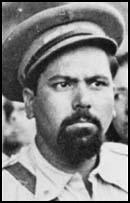Valentín González

Valentín González was born in Malcocinado, Badajoz, on 4th November, 1904. He worked as a coal miner. A trade union activist he was also a member of the Communist Party and on the outbreak of the Spanish Civil War he established a guerrilla unit to fight against the Nationalist Army.
Given the name El Campesino (The Peasant) he became a commander of one of the Mixed Brigades and fought in all the major battles around Madrid. He also too part in the offensives at Corunna Road (December, 1936), Jarma (February, 1937) and Guadalajara (March, 1937).
On 6th July 1937, the Popular Front government launched a major offensive in an attempt to relieve the threat to Madrid. General Vicente Rojo sent the Republican Army to Brunete, challenging Nationalist control of the western approaches to the capital. The 80,000 Republican soldiers made good early progress but they were brought to a halt when General Francisco Franco brought up his reserves.
Fighting in hot summer weather, the International Brigades suffered heavy losses. Three hundred were captured and they were later found dead with their legs cut off. In retaliation, Valentín González executed an entire Moroccan battalion of some 400 men. All told, the Republic lost 25,000 men and the Nationalists 17,000 in the offensive.
Valentín González led his men during the offensives at Aragón (August 1937 - October 1937) and Teruel (December 1937 - February 1938). He also fought in the Catalan campaigns in 1938 before going into exile in the Soviet Union in 1939. González and two other communist leaders, Juan Modesto and Enrique Lister, developed the reputation as being the best successful Republican commanders of the war.
González was highly critical of the strategy of Joseph Stalin during the Spanish Civil War. He claimed that the communists "had established a reign of crime and terror in the Republican zone, both at the front and behind it". This supported what George Orwell had recorded in his book, Homage to Catalonia (1938). Gonzalez said he discovered that during the war Soviet communism was "fascism with a red flag".
González came to regret this decision to live in the Soviet Union. He claimed he would have "preferred ten years of incarceration in France to five years of freedom in Moscow". González was considered to be an "unreliable" supporter of Joseph Stalin and was sent to the Vorkuta labour camp in Siberia where he was forced to work in a coal mine. Gonzalez managed to escape during the Ashgabat Earthquake in 1948.
David Rousset, a left-wing journalist, took out a two-page advertisement in Le Figaro. It was an appeal addressed to all former political prisoners who, like himself, had been confined in Nazi concentration camps. It asked their support in establishing an International Committee Against Concentration Camps to look into the question of forced labor camps in the Soviet Union.
Louis Aragon commissioned Pierre Daix to write an article for the French Communist Party weekly, Les Lettres Françaises, on Rousset. Daix later recalled the attack consisted of: "(1) that Rousset falsely maintained that Soviet citizens could be condemned to forced labour by administrative organs; and (2) that the alleged eyewitness accounts of Soviet concentration camps were nothing more nor less recycled Nazi propaganda." As a result of the article, Rousset sued André Wurmser, Aragon and Daix.
The court-case began in November, 1950. Several witnesses who managed to escape gave evidence in support of Rousset. This included Elinor Lipper, the author of Eleven Years in Soviet Prisons and Concentration Camps (1950) and Alexander Weissberg-Cybulski, the author of The Conspiracy of Silence (1950). Józef Czapski, the author of The Inhuman Land (1951) gave testimony about his time in the internment camp in Starobilsk. He praised Rousset's attempts to discover the truth about the labour camps. He also reported on his investigation of the Katyn Massacre. The defence lawyer, Joë Nordmann, accused Czapski of "rehashing old Nazi propaganda" that had been invented by Joseph Goebbels.
González was also called to give evidence on behalf of David Rousset. He testified that in the camps he was in "a small minority of hard-core criminals - murderers, rapists, armed robbers, united in their depravity and their bond of thieves' honor - exercised an internal reign of terror over the much larger population of politicals." He added that the guards had the right to rape any woman in the camp they desired.
Rousset won support from François Mauriac who argued in Le Figaro that: "David Rousset has already won... We don't need any other proof beyond the maladroit attempt of the Stalinists to keep the witnesses from appearing. You see, André Wurmser, he (Stalin) should have killed them all. Your masters are still too humane, for a few victims escaped." The court agreed and the judge awarded Rousset 100,000 francs.
González published his autobiography, Listen, Comrades: Life and Death in the Soviet Union in 1952. After the death of General Francisco Franco and the fall of his fascist dictatorship, González returned to Spain.
Valentín González died in Madrid on 20th October, 1983.

